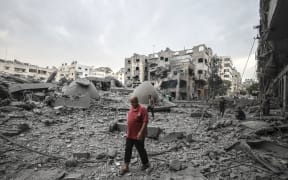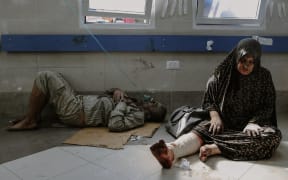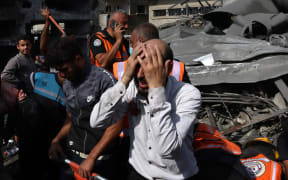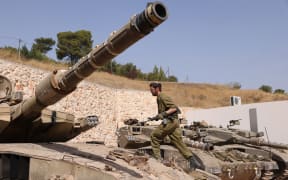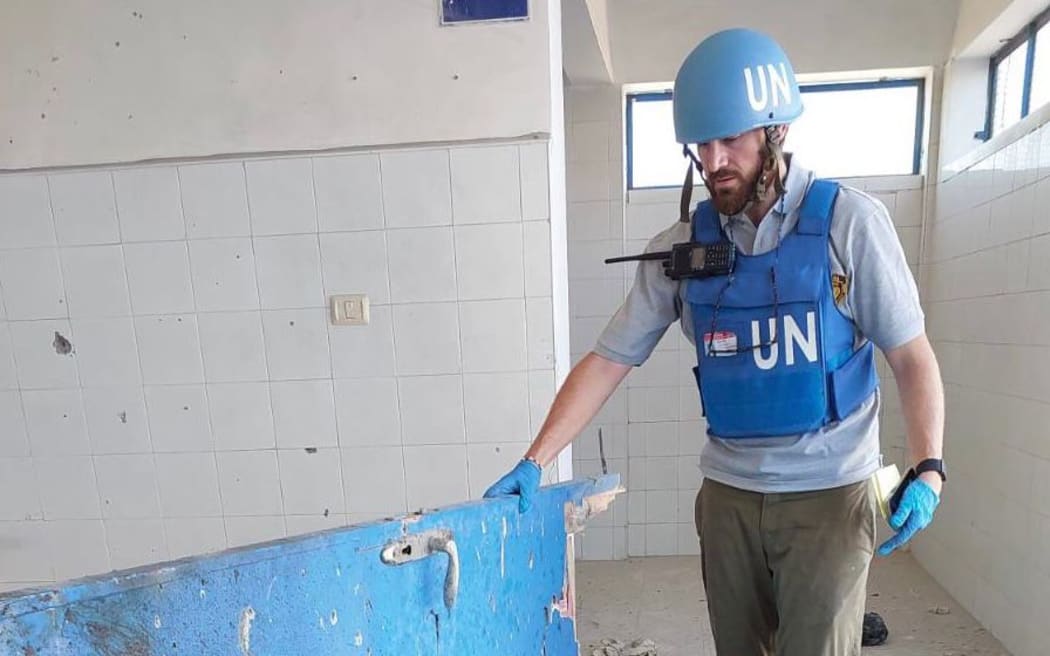
Hector Sharp assessing a school hit during the conflict. Photo: Supplied / Stefania Rigotto
Evacuating the UN headquarters in Gaza after Israel called for civilians to leave the city was a "very, very frightening situation", says a New Zealander working there.
Over the weekend, 34 trucks carrying medical and food supplies entered Gaza through the Rafah crossing from the Egyptian side.
The region had previously been out of operation after bombardments hit the Gaza side of the border, making it difficult to deliver aid.
Wellington-born Hector Sharp has worked with the United Nations Relief and Works Agency for Palestine Refugees (UNRWA) for more than three years.
His work in the UN legal department involved navigating the intricate web of international humanitarian law, spanning from procurement and contracting to human rights advice and administrative law.
However, his duties changed once the conflict broke, focusing on ensuring the safety of civilians and documenting incidents of collateral damage.
"All non-essential work stops, and we focus 100 percent on the conflict.
"That relates to making sure that both parties to the conflict are aware of where our institutions and installations are, so they abide by their obligations under international law not to target or strike UN premises."
He said there was an urgent need for humanitarian aid.
"We currently have over 400,000 internally displaced persons on the ground in our shelters and institutions, but the situation in terms of aid is dire.
"It's hard to know when help is going to arrive. We are on the ground here, and there's a whole other ball game happening on the political level, which our headquarters are engaging in, but these matters are political first and foremost.
"The Gazans need aid, and the parties to the conflict and Egypt, which controls the only open border right now, are the ones who can allow that aid. We are hopeful because the priority really has to be lifting the siege on Gaza."
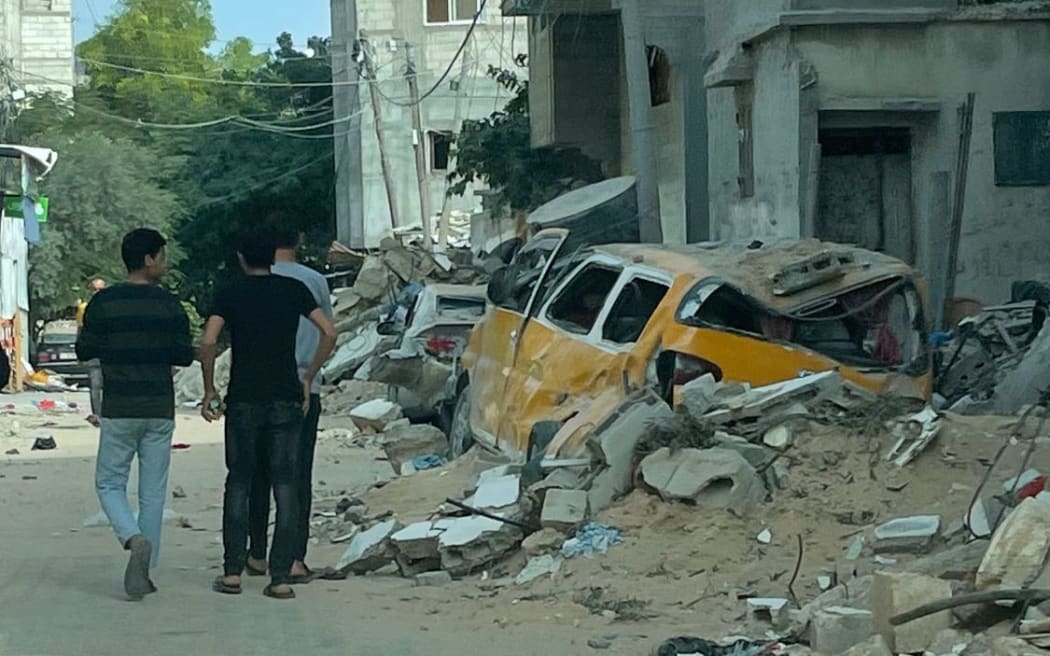
A street in Khan Younis Camo in South Gaza. Photo: Hector Sharp
'Less than four days left of fuel'
Sharp said fuel played a key role in the conflict zone.
"The supplies we got over the weekend were mainly food and medical supplies, but what we urgently need is fuel, which powers everything from hospital generators to desalination plants - what we use to take water from the sea and pump it out to the population to drink - as well as bakeries and the UN's own vehicles.
"We had existing stocks [of fuel] before the conflict, and we've been able to get some small resupplies, but we have less than four days' worth of it left.
He said the existing fuel was already being rationed.
"We can't ration any further. If we don't see fuel in the next few days, the situation will take a turn for the worse."
Sharp said volunteers were hopeful that the latest convoys with aid would be the start of a continuing pipeline of much-needed aid.
"There are negotiations going on at a state-to-state level, and we have to trust our UN personnel with those negotiations, as they advocate for what we need."
'I have friends that are stuck in Gaza'
Sharp helped evacuate the UN Gaza HQ when Israel called for civilians to leave Gaza City as a "significant operation" loomed.
"That was, to be honest, a very, very frightening situation," he said.
"It escalated the conflict very quickly. It was a general evacuation, so we're talking about over 1,000,000 people being asked to evacuate within a very short period, which obviously caused panic.
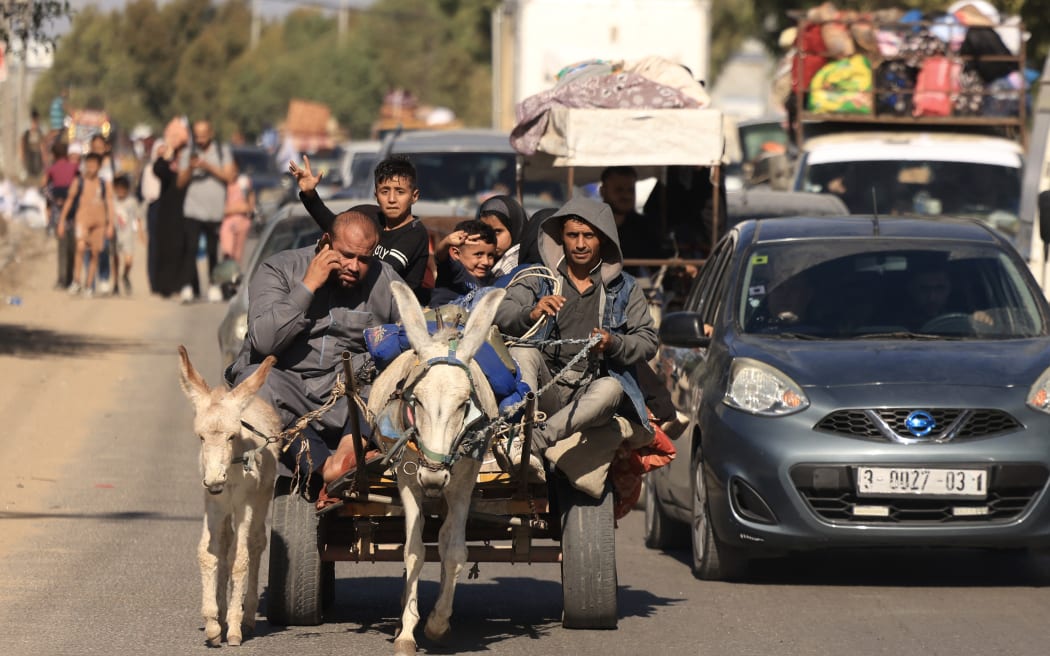
Riding a donkey drawn cart as family along with hundreds of other Palestinian carrying their belongings flee following the Israeli army's warning to leave their homes and move south before an expected ground offensive, in Gaza City on 13 October, 2023. Photo: MAHMUD HAMS / AFP
The UN was in a much better position to evacuate its personnel and staff than the general population, he said.
"We have armed vehicles, security professionals, logisticians, and supplies.
"But I have colleagues, I have friends that are stuck in Gaza. They have children injured, elderly people. It was hard to watch."
Sharp said safety was a fluid concept on the ground.
"Safety is relative here, I believe. I was at a school this morning when a woman pulled me aside and said to me in perfect English, 'this is not safe.'
"That is a message that's coming through loud and clear. You talk to anyone here, and all they ask for is safety, and that's why they're going to our schools, and that's why it's so important that we keep our installations safe for those in need."
"Gaza has life"
Amidst the horrors of the conflict, Sharp said it was not always like this in the Gaza Strip.
"Before coming here, I read the headlines, I watched the news the same as anyone else. But when I moved here, it was a different story.
"Gaza has life; there's a surf club, there's a cycling club. I'd go for a run every morning along the security zone.
"There's life here, and it's hard to watch that being diminished during the current situation. What happened here was horrendous."

